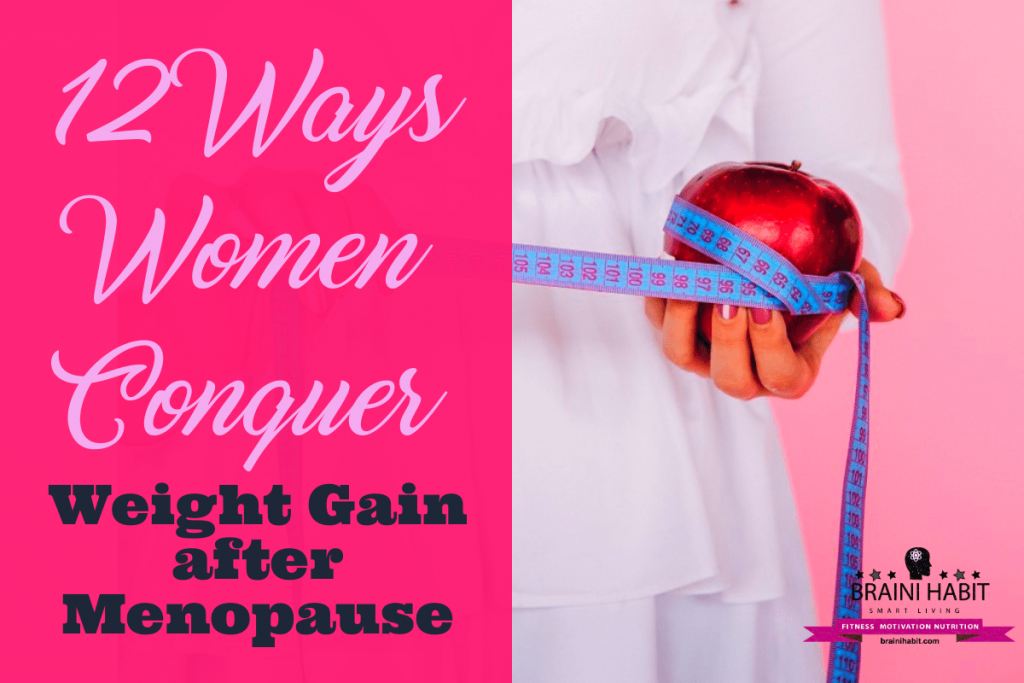Menopause is an inevitable part of life for every woman. What may not be inevitable is the weight gain that follows a menopause.
Certain hormonal changes occur in a woman’s body after she attains menopause. These changes gradually slow down body metabolism. With poor metabolism the body loses muscle mass and gradually reduces the rate of calorie burning.
As a result, a woman gains excess fat post-menopause. This weight gain can harm your health leading to diabetes, respiratory, and cardiovascular diseases (1).
However, post-menopausal weight gain can be controlled completely with some cautious lifestyle changes. Here are 12 ways on how women can beat weight gain after menopause.

- 1. Sweat it out
- 2. Plan your Meals
- 3. Say a Big NO to Sugar
- 4. Restrict alcohol and smoking
- 5. Constrain Sodium Intake
- 6. Keep yourself hydrated
- 7. Bedtime matters the most
- 8. Do not ignore your medications and its impact
- 9. Seek expert guidance if needed
- 10. Long-term health regime works better
- 11. Live active
- 12. Be in a positive surrounding
- The bottom line on ways women use to conquer weight gain after menopause
1. Sweat it out
Exercise can do wonders in weight management for women of all age groups. It can help in more than one way to fight midlife obesity that results from menopause.
Exercise or any physical training helps build muscle strength in turn burning more calories and stored fat (2). To help your body adapt to these physical activities, you can try a combination of workouts throughout the week.
Here are a few post menopause workouts you can try:
Cardio workout: Activities like walking, jogging, and swimming engage large muscle groups while balancing heart rate.
Strength training: Osteoporosis is common during or after menopause which can be averted with strength training. This workout stimulates body metabolism that burns excess fat and also provides muscle and bone strength.
Try dancing: This is something different from all those serious physical trainings. This can be more fun than the treadmill or the dumbbells and yet provide similar effects (3). Try out Jazz, Salsa, Zumba, ballet, if that’s your cup of tea.
Yoga: It is one of the proven ways to maintain a healthy weight for people of all age groups. Try a set of yoga asanas, pranayama (breathing exercise) and meditation to beat post-menopausal obesity.
Take-Away: Exercise can naturally stimulate body metabolism that slows down post menopause resulting in the accumulation of fat. A combination of different forms of workouts can energize your body without stressing your muscles.
2. Plan your Meals
Proper diet coupled with exercise can take you a long way to retain that fit body for life (4). Since menopause diminishes your metabolism, your body slows down the calorie-burning process which settles in as fat.
A post-menopausal diet should be planned to boost body metabolism naturally minimizing calories (5).
Here is what you should include in your meals:
Go low on carbs: Consumption of carbohydrates in lower amounts promotes metabolism which helps to burn more calories in women (6). So, maintain a distant relationship with white bread, potatoes, pasta, tortilla, and starchy veggies.
Increase protein intake: Protein helps to curb your appetite, and at the same time accelerates body metabolism. High protein and low carb meals strike an ideal nutritional balance to help you lose weight post-menopause.
Consume soluble fiber: Soluble fiber effectively nurtures your gut bacteria to stop the storage of excess body fat (7). Dietary fiber is also effective in breaking fat cells into energy thus reducing obesity.
Don’t forget green tea: The presence of toxins can affect your metabolism which decreases the calorie-burning process resulting in obesity. Green tea contains a good amount of natural anti-oxidants that removes all toxins from the body triggering natural metabolism.
Try mindful eating: Eating wholesome meals at the right time can increase its positive impact on your health. Stick to a fixed meal schedule which includes apt intervals between breakfast, lunch, and dinner.
Avoid spices: Less spicy foods can be good for your digestive system as well as improve your metabolism. Consumption of spicy food can also lead to an increase in hot flashes during menopause making the condition worse.
Take-Away: Balanced nutritional diet can go a long way to control post-menopausal obesity by accelerating body metabolism. The right proportion of protein, vitamins, fiber, and antioxidants can prevent fat accumulation and also encourage natural calorie-burning process.
3. Say a Big NO to Sugar
Insulin resistance is a common problem among women after menopause (8). A continuous level of high blood sugar can lead to this problem.
To control this situation, women should curb their sugar intake that matches their diminishing body metabolism post menopause (9).
Here are few ways to cut down sugar:
Avoid processed food and carbs: Processed foods contain added sugar that can increase your blood sugar level. Carbohydrates present in processed foods slow down the metabolism further causing insulin resistance.
Limit sweetened beverages: Use tall, slim glasses for your beverages or better shift to healthier options like soya milk, ice tea with sugar substitutes, etc. This will keep your blood sugar level in check.
Choose healthier substitutes: You can switch to harmless substitutes to appease your cravings. Eat fruits instead of cakes and cookies for dessert, low-fat milk instead of soda, and opt for unsweetened version of every food.
Read labels before purchasing: Some food may appear healthy, but are not. Read the label to find if it contains added sugar, added flavor, trans-fat, etc. All these contribute to the accumulation of excess fat.
A low sugar diet will not only balance your blood sugar level but will also stabilize your hormonal changes during menopause to maintain a healthy weight.
Take-Away: Intake of sugar in unchecked amounts can result in high blood sugar levels during menopause. Sugar consumption needs to be controlled to prevent high-calorie intake that can disturb hormonal balance to stimulate weight gain.
4. Restrict alcohol and smoking
Excess alcohol can make menopausal syndromes worse and also leads to an increase in stored fat (10, 11). Menopause causes an imbalance in hormones like estrogen and testosterone which is further declined with the alcohol abuse.
However, a light and a moderate amount of alcohol consumption has been proved beneficial for post-menopausal women in preventing obesity and certain diseases (12).
Studies have proved that smoking can cause early menopause in women (13). This is because smoking triggers certain harmful effects in women that hasten menopausal syndromes like hormonal imbalance, anxiety, poor sleep, hot flashes, etc.
Smoking can also lead to fatigue and further slows down metabolism aiding post-menopausal weight gain. Apart from obesity, smoking can also affect the nervous system and respiratory system in middle-aged women.
Hence, it is advisable for elderly women to completely quit smoking to prevent weight gain after menopause. Try to get medical assistance to cut your cravings for healthy weight management.
Take-Away: Consumption of alcohol in excess amount can worsen post-menopausal syndromes causing unhealthy weight gain. While a moderate level of alcohol can be beneficial for middle-aged women, smoking needs to be stopped completely to prevent post-menopausal obesity or early menopause.
5. Constrain Sodium Intake
Studies have proved that an increased amount of sodium intake can decrease bone density in women after menopause (14).
Higher levels of sodium can create hormonal imbalance further slowing down body metabolism resulting in post-menopausal obesity.
Here’s why you should limit sodium intake after menopause:
Declines estrogen: Estrogen is a hormone responsible for controlling blood pressure and metabolism. Menopause results in declining estrogen which is further diminished by higher levels of sodium.
Increases blood pressure: Women become more salt-sensitive after menopause. This directly impacts the blood pressure level. A higher amount of sodium intake further affects blood pressure increasing post-menopausal hypertension (15).
Diminished metabolism: A higher level of sodium intake slows down metabolism in middle-aged women (16). This results in the decline of the calorie-burning process which will help in fat accumulation.
Poor bone health: Higher levels of sodium intake may increase the discharge of calcium through urine in women. This calcium loss creates a deficit in the body, leading to lower bone density.
Take-Away: Excess amount of salt intake can further lower estrogen levels in women after menopause. Lower levels of estrogen can lead to poor metabolism resulting in unhealthy weight gain. It can also affect bone health and increase hypertension.
6. Keep yourself hydrated
Water can solve many health problems. Studies indicate that an adequate intake of water has proved beneficial for women fighting obesity (17).
Here are ways in which water intake can help you lose weight during or after menopause:
Controls appetite: Having a glass of water before every meal will help you determine your true physical hunger. This way you will consume only that amount of calories that is needed in your body.
Replace liquid calories: It is a good idea to substitute all sugary beverages with water. Water has no calories and yet it can quench your thirst.
Improve workout impact: Water hydrates your muscles and organs that are involved during a workout session. A hydrated body shows better results after workouts in shedding excess fat.
Support better metabolism: Water aids in better digestion and also flushes out toxins from the body. This boosts body metabolism to burn fat faster.
A hydrated body can also lower the risk of several health issues in elderly women like water retention, bloating, abdominal fat, and fatigue.
Take-Away: Water flushes out body waste to help strengthen metabolism in post-menopausal women. Water can replace calorie-loaded beverages and also curbs appetite to help beat weight gain after menopause.
7. Bedtime matters the most
Sleep disorder has proved to contribute to obesity in postmenopausal women (18). This might even lead to several other diseases in middle-aged women.
A sound sleep by following a stable routine is essential for women to prevent weight gain after menopause. This will reduce anxiety and stress levels while improving metabolism and calorie expenditure.
Here are a few ways to help you maintain a healthy sleep cycle:
Keep distractions away: Put all your electronic distractions away before hitting the bed. This state of inactivity will help your brain relax and you may fall asleep easily.
Anxiety management: Stress and anxiety are the biggest restraints to proper sleep. Manage anxiety level, seek expert help if required but never ignore the value of a proper slumber. It has several benefits for women after menopause.
Stick to a routine: For women who face sleep disorder during or after menopause, following a fixed sleep cycle is necessary. Going to bed and waking up at a fixed time will make your body adaptive to adhere to the sleep cycle.
Take-Away: Sleep disorder causes weight gain in women after menopause. It is essential for women during or after menopause to follow a healthy sleep cycle and manage stress to curb obesity.
8. Do not ignore your medications and its impact
Routine medications are common in middle-aged women, especially post-menopause. Studies have suggested that few drugs can cause weight gain (19).
Also, certain medicines can help you to curb swelling in your body, for example medication for thyroid, diabetes, etc. (20).
So, avoiding routine medications to keep your weight in check after menopause may not be a good idea.
Here’s what you can do to restrict medication impact on your body weight:
Be careful with new medications: When you are prescribed new medications, you have to be vigilant about its effects on your body. If you see any sort of negative changes in your body you need to consult your health expert.
Check your weight often: You can monitor your post-menopausal weight by checking it often. Fix a particular time to stand on that bathroom scale which is preferably in the morning. Never check your weight at unsystematic timings, it may be confusing.
Consult your doctor: If you notice some remarkable changes in your body weight after medication, discuss the issue with your doctor. Try getting an alternative medicine prescribed which might have a lesser impact on your weight.
Take-Away: Medicine can impact your body weight in both ways, either it can promote weight gain, or it can curb bloating. Ignoring medications for existing health issues can even lead to obesity. Monitor your weight after menopause and consult your doctor if you notice a sudden weight gain.
9. Seek expert guidance if needed
Sometimes weight gain after menopause can be a perpetual problem even if you follow a regular balanced diet, adequate exercise, and proper medicines. If this happens, you need to seek help from an expert.
Many therapies are applied to control weight gain after menopause. You need a professional to guide you through this by weighing the risks and benefits appropriately (21).
Following are probable reasons behind seeking a professional help to cope with post-menopausal weight gain:
Suffering a new health condition: While existing health issues are taken care of with the right medication a new health condition might have developed recently. A health expert can diagnose the problem and address it medically.
Your health regime may be inadequate: Your routine workout and diet may be deficient to suffice your body’s requirements to trigger healthy metabolism. A little change suggested by a professional can get your health regime on track.
An expert will know what is best for you: There are several medications available to control weight gain after menopause. You need to find what is right for you to curb post-menopausal weight gain without risking your health.
Take-Away: The right diet and exercise may sometimes fall inadequate to curb post-menopausal weight gain. An expert can help you address a health issue or a drawback in your regime straight away.
10. Long-term health regime works better
Following a healthy regime that combines proper diet, workout, and medication is essential after menopause.
What is even more crucial is following this regime on a long-term basis. Long-term regime means you have to plan your lifestyle changes in a way that you can follow for a long period.
Maintaining a short term regime will give you short term results only and once you stop continuing the regime it will increase all post-menopausal syndromes.
Here are ways to help you plan your long-term health regime:
Don’t go on a crash diet: Crash diet means absolute restriction to fats, carbs, and sugar. While this will show results on your body weight faster, it will become difficult for you to continue forever. Once you restore to your normal diet after the weight loss, your post-menopausal obesity will be back in no time.
Try a mix of heavy and light workouts: Strength training and cardio workouts are effective in shedding extra pounds faster, but middle-aged women cannot continue with that for long (22). So practicing a combination of heavy and light activities will be easier to follow and will also burn calories at a balanced rate.
Value your leisure: Make time for yourself, do what you love, or nourish a long-lost hobby. While health regime is important to prevent post-menopausal obesity, it should not become a task for you to complete or a goal to achieve.
Plan a health regime that is fun for you to follow and is effective in curbing post-menopausal weight gain too. This way your regime becomes a habit and not a chore.
Take-Away: Short term health plans will not help women to lose weight post-menopause. Sticking to long-term, easy to follow plans will give better results in maintaining a healthy weight after menopause.
11. Live active
An active lifestyle can bring significant changes in your body weight after menopause (23). Elderly women are incapable of undergoing rigorous physical training to lose weight due to their age and health issues.
Women after menopause are most likely to choose light exercise to burn calories. The impact of light exercise may prevent weigh gain but not effective on weight loss.
Here are ways that will help you lose weight through daily activities at home:
Steady expenditure of calories: Involvement in daily activities like gardening, cleaning, cooking, etc. can help you burn calories at a stable rate throughout the day which light exercise may not do.
Reduce fatigue: Doing little household chores will keep you active throughout the day. This will decrease fatigue and will always keep you motivated to maintain your home and a healthy body.
Less exhausting: Elderly women might find long workout sessions exhausting to continue due to health issues. Simple household chores are less exhausting while giving similar results as workouts if done for a longer period of the day.
Take-Away: Staying active by doing simple household chores like cleaning, cooking, gardening, etc. can reduce fatigue and is less exhausting than exercise. Little activities can steadily burn calories throughout the day stimulating weight loss.
12. Be in a positive surrounding
Find people who want to beat weight gain after menopause like you. Form a group of like-minded people who will motivate each other towards a common objective.
Studies have shown that working out together can be more fruitful for elderly women (24).
Here’s what you can expect from your workout group:
Inspire each other: Positive people can motivate other to excel. While menopause syndromes can be difficult to deal with, the fact that you can share your concerns with someone who is going through the same can help.
Reduce stress: Fighting post-menopausal weight gain can be stressful. A positive group will set an example to help you to know what you can expect from a health regime. You can discuss your anxieties, and take inspiration from others who cope with the same.
Better workout results: Motivation works better than any medication. Once you feel motivated by your partner to maintain a healthy weight after menopause, you will not require an alarm clock to wake up for early morning walks.
Take-Away: Workouts in group inspire to do better and also provide emotional support to deal with post-menopausal syndrome. Group fitness sessions can improve exercise results in elderly women and help them set realistic expectations.
The bottom line on ways women use to conquer weight gain after menopause
Maintaining a healthy weight after menopause is necessary to prevent respiratory problems, cardiovascular diseases, PCOS, arthritis, and diabetes.
The process to control weight gain after menopause involves a range of systematic approaches that will improve your overall health.
Apart from helping you to maintain a healthy weight during and after menopause, this regime will increase your body metabolism, energy, and concentration to make you feel at your best.
Never ignore sudden weight gain during or after menopause. While obesity after menopause can seem a minor problem, the issue can lead to a serious health condition if ignored. Simple lifestyle changes are all it requires to live a healthy life after middle age.





